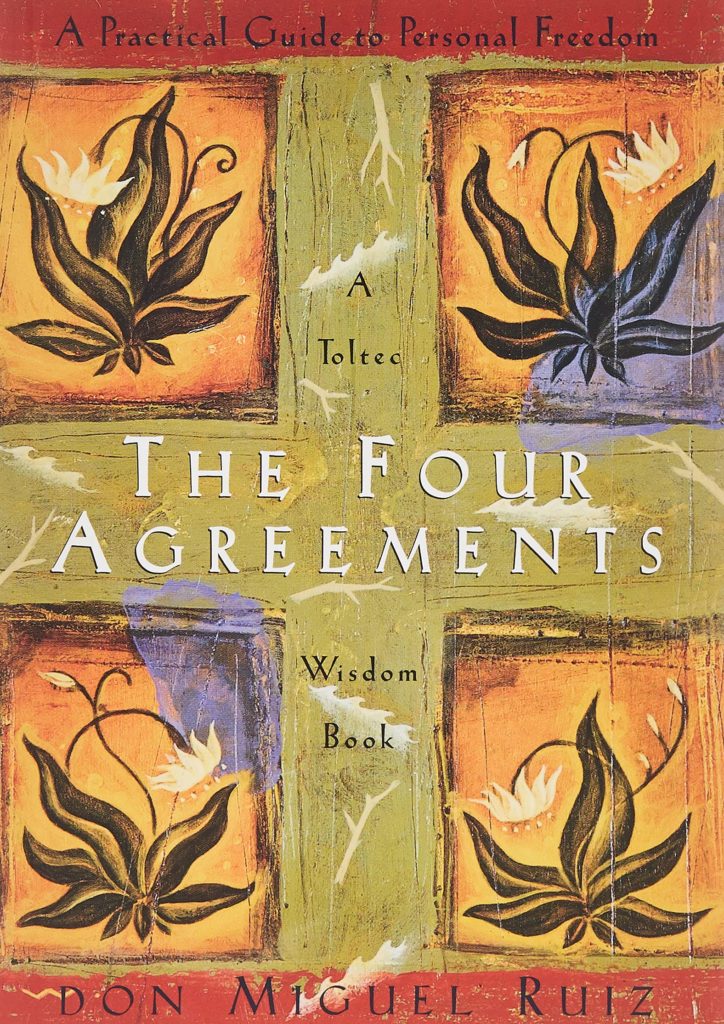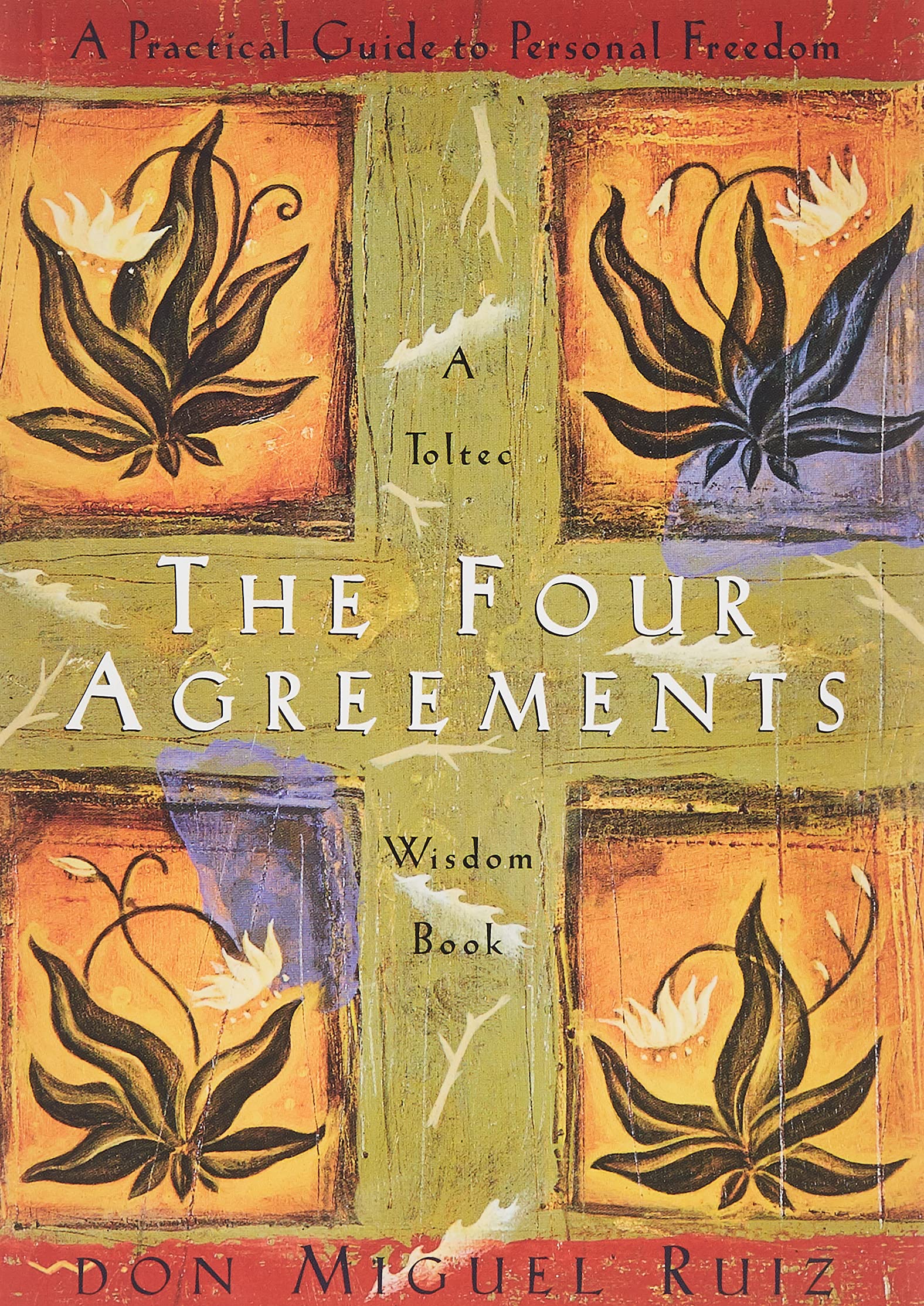By Olivia Schmid | | Opinions Editor

Although it serves as the smallest book in my self-help book collection (so far), the wisdom found within Don Miguel Ruiz’s The Four Agreements is nothing short of major. In just 160 pages, you’ll be able to get the scoop on just how to achieve personal freedom.
We have to intentionally work to be truly free and happy. Ruiz explains further that, “Just being ourselves is the biggest fear of humans. We have learned to live our lives trying to satisfy other people’s demands. We have learned to live by other people’s points of view because of the fear of not being accepted and of not being good enough for someone else” (17). In order to put this behind us and find personal fulfillment, Ruiz introduces the four agreements.
THE FIRST AGREEMENT: BE IMPECCABLE WITH YOUR WORD
We have the power to create, and your intent manifests through the words you speak. Words are powerful (as you know) and serve as a double-edged sword (again, not a new concept for most people). They can create the most beautiful dream or create living hell and utter chaos. Ruiz relates the human mind to fertile space where seeds can be planted. He suggests to take note of which kinds of seeds our mind is fertile for, and to prepare our mind to receive seeds of love. You will only receive a negative idea if your mind is fertile ground for that idea. Interesting perspective, Ruiz.
Impeccability means “without sin.” Ruiz claims that a sin is anything you do that goes against yourself. In this case, “when you are impeccable, you take responsibility for your actions, but you do not judge or blame yourself” (31).
Be impeccable with your word. Use your words and your voice to share love—and start with yourself. Tell yourself how much you love yourself (cheesy, but whatever) and use words to actively break all agreements that make you suffer.
THE SECOND AGREEMENT: DON’T TAKE ANYTHING PERSONALLY
This is hard. We (or at least I) take EVERYTHING seriously… your friend’s sister’s cousin’s cousin shit-talks about you and all of a sudden your weekend is ruined and not even a Starbucks iced peppermint mocha with oat milk can save the day. Here is where Ruiz reminds us of personal importance. We take everything to heart, and we way too often make the assumption that everything is about ourselves.
Nothing other people do is because of you.
Read that again. Nothing other people do is because of you. “All people live in their own dreams, in their minds; they are in a completely different world from the one we live in” (48). When you take something personally, you feel offended… so, you 1) defend your belief or 2) create conflict. Neither are necessary in most cases. You are never responsible for the actions of others; you are only responsible for you.
When you don’t take anything personally, you can:
- Say “I love you” without fear of rejection
- Ask for exactly what you need
- Say yes or say no without guilt or self-judgement
- Follow your heart
- Stay in the state of bliss
So, my dear friend, do you take things personally? You’re definitely not alone… this is one I’ll have to work on, too.
THE THIRD AGREEMENT: DON’T MAKE ASSUMPTIONS
The problem with assumptions is that when we make them, we believe them to be truth. It is better to ask a clarifying question, than to assume an answer that might be true. Which we know, my friends, do we not? We too often assume we know everything about any given situation, even if we weren’t even there. So much drama can be avoided simply by communicating with one another. “We make all sorts of assumptions because we don’t have the courage to ask questions” (68). Damn, Ruiz! Take it easy on us college kids, puh-lease.
Don’t make assumptions. Ask for what you want. Everyone has the right to say yes or no, but you ALWAYS have the right to at least ask.
THE FOURTH AGREEMENT: ALWAYS DO YOUR BEST
Your best will differ from day to day, circumstance to circumstance. Be gentle with yourself. As long as you do your best, you don’t have any reason to judge yourself. Look forward to the action of doing your best, not just the result that comes from it. “When you are doing your best just for the pleasure of doing it, you are taking actions because you enjoy the action” (81).
Ruiz joins the plethora of other authors who stress the importance of breaking bad habits; in The Four Agreements, Ruiz calls this breaking old agreements. Read on!
THE TOLTEC PATH TO FREEDOM: BREAKING OLD AGREEMENTS
To find freedom, we must get rid of what Ruiz refers to as “parasites.” First off, parasites in general are disgusting. Even just typing the word parasite here for you all makes me weak-kneed. Ahhhh. Anyway, in order to get rid of parasites, we can:
- Face each fear head on
- Every time we face one of these fears, we become a little more free.
- Stop feeding the parasite.
- Gain control of our emotions, so we can refrain from fueling the emotions that come from fear.
Ruiz then discusses the Art of Transformation, the Discipline of the Warrior, and the Initiation of the Dead, all of which are super interesting but complex parts of the book that I simply can’t simplify for you (so take that as one more incentive to run to Target for a copy tomorrow!).
THE NEW DREAM: HEAVEN ON EARTH
Ah. A list. My kind of chapter!
Ruiz says to use your imagination to see yourself living a new life:
- You have permission to be happy and to love your life.
- Live your life without fear of expressing your dreams (big one for me!)
- Live your life without fear of being judged by others (You are not responsible for anyone’s opinion; you don’t control anyone, so no one controls you)
- Live your life without judging others.
- Live your life without fear of loving and not being loved.
- Live your life without being afraid to take risks and explore life.
This is heavy, oh my. Ruiz claims that happiness is a choice, and so is suffering. Whether you agree with this or not, “You were born with the right to be happy” (84). You have the right to be happy, my friend. In this life, you can be and do whatever you want—so add happiness to that list. You’ve been happy before, and you can do it again.
And that’s the gist!
Sophomore Olivia Schmid is the Opinions Editor. Her email is oschmid@fandm.edu.
